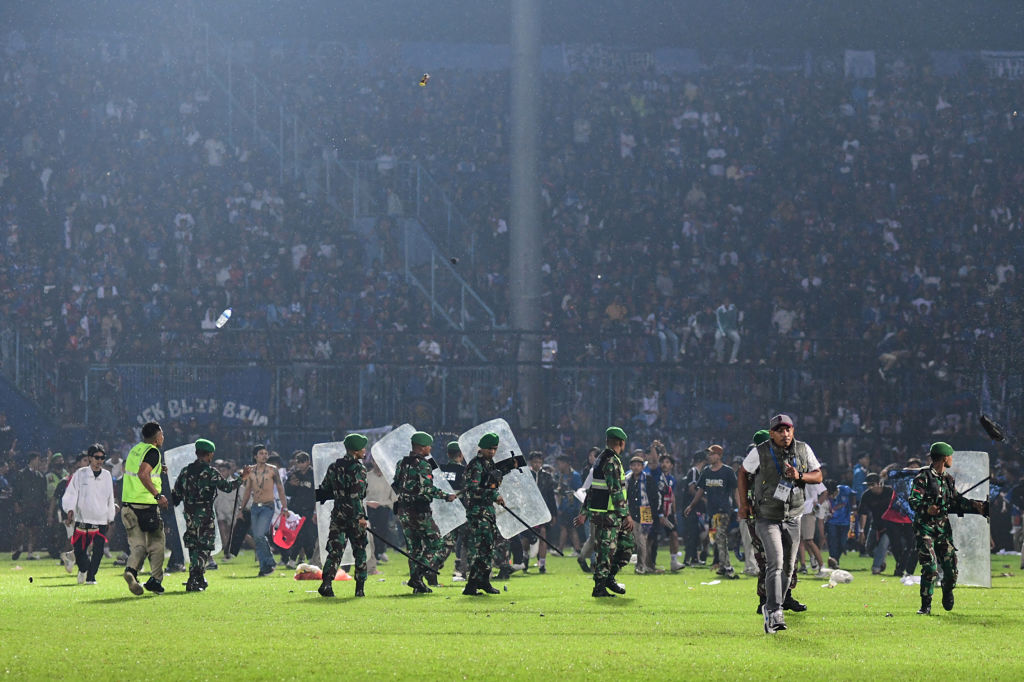
At least 125 people died at an Indonesian soccer match Saturday night after police used tear gas on fans who rushed towards the field when Arema FC, the home soccer team in Malang, lost, causing many to be trampled or suffocated.
There were only Arema FC fans present at the match at Kanjuruhan Stadium against Persebaya Surabaya, as organizers wanted to avoid conflict prior to the game, The Associated Press reported. But when Arema FC lost to Persebaya Surabaya (3-2), angered fans began to throw bottles and other objects at players and soccer officials.
Witnesses also told the AP that police beat attendees with sticks and shields before spraying the crowds with tear gas, inciting chaos as hundreds ran towards the exit.
Another 300 people were injured by the incident, and at least five police cars outside the stadium were damaged and set on fire, according to The New York Times.
More from TIME
The use of tear gas during soccer matches is banned by FIFA, soccer’s global governing body. FIFA released a statement after the tragedy, calling it a “a dark day for all involved in football and a tragedy beyond comprehension.”
“Together with FIFA and the global football community, all our thoughts and prayers are with the victims, those who have been injured, together with the people of the Republic of Indonesia, the Asian Football Confederation, the Indonesian Football Association, and the Indonesian Football League, at this difficult time,” FIFA president Gianni Infantino said in a statement.
In a speech after the incident, Indonesian President Joko Widodo asked the national police chief to investigate the incident and ordered an evaluation of security at soccer matches.
“I regret this tragedy and hope that it will be the last to occur in Indonesian football.” Widodo said. “We cannot have any more (of this) in the future.”
Police defend the use of tear gas
Many have condemned the use of tear gas at the match, especially because it was used in a confined area where fans could not easily move towards fresh air.
The Center for Disease Control and Prevention says that spraying tear gas poses serious risks, as long-lasting exposure to a large dose of this agent can cause blindness, respiratory failure and even glaucoma.
Inspector General Nico Afinta, the East Java Police Chief, defended the decision to use tear gas, saying that there was “anarchy” at the stadium.
The Indonesian Legal Aid Foundation condemned the state for the casualties, saying that they should be held responsible for the incident.
“We suspect that the excessive use of force through the use of tear gas and inappropriate crowd control was the cause of the large number of fatalities,” the organization said in an online statement. “The use of tear gas that was not in accordance with crowd control procedures resulted in supporters in the stands jostling for an exit door, short of breath, fainted and collided with each other. This was exacerbated by the overcapacity of the stadium and the big match which was held at night.”
Mahfud MD, the Coordinating Minister for Political, Legal and Security Affairs of Indonesia, said that the local soccer committee had sold 42,000 tickets for the match despite the stadium’s 38,000 capacity, according to The New York Times.
One of the deadliest matches in history
The Indonesia game marks one of the deadliest soccer matches in history, though not as severe as the 1964 match in Lima, Peru, which ended with more than 300 deaths after a stampede broke out at the National Stadium, The New York Times reports.
Soccer is listed as the most popular sport in Indonesia, and existing rivalries between domestic soccer teams have previously caused conflict—though it usually occurs away from the stadium.
In 2018, a match between domestic Indonesian teams Persija Jakarta and Persib Bandung ended in tragedy after a Persija Jakarta fan was killed by Persib Bandung supporters. In 2019, during a World Cup qualifying match against Malaysia, Indonesian fans threatened and incited violence, causing Malaysia’s visiting sports minister to leave the stadium.
How has the soccer community responded?
Fans, teams and players have expressed their support of Indonesia in the midst of the tragedy.
Spanish soccer player Sergio Ramos called the event heartbreaking, saying his thoughts were with the victims and their loved ones. He was joined by D.C. United’s Wayne Rooney, and his current league team, Paris Saint-Germain, in offering support.
Other soccer leagues, including Arsenal, Manchester United, and Liverpool FC, tweeted that they were “deeply saddened” by the events that took place at Kanjuruhan Stadium.
La Liga, the men’s first-division Spanish soccer league, announced that they will honor the tragedy by holding a minute of silence before all of their matches.
Arema FC President Gilang Widya Pramana apologized for the fans’ actions in an online statement. “I feel deep sorrow and condolences for the Aremania who were victims of the Kanjuruhan disaster last night. I hope the bereaved families will be given courage,” he said.
Indonesia’s soccer association, known as PSSI, suspended Liga 1, the country’s top division, indefinitely and has banned Arema from hosting any more soccer matches for the rest of the season.
More Must-Reads From TIME
- The 100 Most Influential People of 2024
- The Revolution of Yulia Navalnaya
- 6 Compliments That Land Every Time
- What's the Deal With the Bitcoin Halving?
- If You're Dating Right Now , You're Brave: Column
- The AI That Could Heal a Divided Internet
- Fallout Is a Brilliant Model for the Future of Video Game Adaptations
- Want Weekly Recs on What to Watch, Read, and More? Sign Up for Worth Your Time
Contact us at letters@time.com